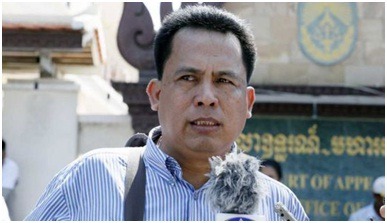Interview with Dr. Kem Ley, former political analyst and leader of the newly formed Grassroots Democracy Party (GDP) in Cambodia. The interview took place in Phnom Penh on 11 Nov, 2015.
Picture: Phnom Penh Post, Mon, 1 December 2014
Q: Cambodia has a very large youth population and yet their directing engagement in politics is very limited, why is that?
In Cambodian political culture, there is a common perception that youth are not aware of their rights and have low awareness of politics. The second thing is that current laws prohibit youth from becoming involved in politics. Both at the national and sub-national level, there are age restrictions for potential candidates and to apply for candidacy in the national assembly you need to be 25 years or older. The third issue, in my opinion, is that politics in Cambodia is relatively new as our first general election was in 1992. But everybody just woke up in the last election (2013). During the last election is when we saw a lot of development from technology. However, universities and schools did not teach enough about politics and youth had to learn about politics and how to engage through informal channels.
Q: How should we engage with youth to increase participation?
In my opinion, the youth movement and the youth organizations should join forces and use advocacy to send a strong message to all the political parties, demanding the introduction of a quota for youth representation. Secondly, they should analyze existing laws and propose a change to the minimum age of candidates to be 18 years and older*. Lastly, the youth need to educate themselves more and try to understand, and become familiar with, the political system and political culture. They should engage themselves more in politics.
Q: If youth was to do those things and become more engaged, what benefits do you see for Cambodia’s future?
When looking at the old political culture in Cambodia, I’ve learned that nothing has changed. We need new leadership, a new cadre of youth. They understand about the development of technology and how it can be used for the benefit of the country and for them. You see, the role model for youth is within the private sector and organizations that are not just concerned about themselves but about how to become more productive. Within the party, or within the national framework, if youth become more involved, I think the situation will change more quickly. If we allow the youth to become more engaged from the very beginning they can learn from the old system, share experiences, and continue from there. Otherwise, when the old politicians are gone politics will die and the opportunity for youth to learn will be gone. Learning is not just about what they teach at University or at school but learning from experience and participation.
In short, in Cambodia, as you may already know, many people from the older generation do not retire, they work until the end of their life. This is also the case in politics and means that the youth have fewer chances to engage. If the youth can become more involved in politics, maybe they can respond to their own needs, such as improving the employment rate and responding to other youth specific challenges. The youth in almost all sectors, public, private, and NGO, are dynamic and more productive than the older generation ever will be.
*Note: Legal age for marriage in Cambodia is 18 years.

